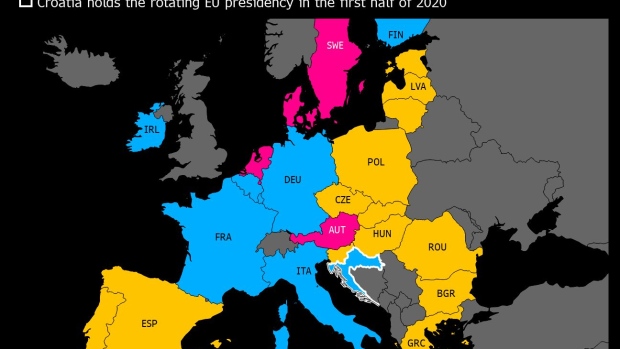Feb 20, 2020
EU Leaders Gear Up for Money Clash to Fill the Post-Brexit Hole
, Bloomberg News

(Bloomberg) --
The European Union‘s first high-level meeting since Brexit risks ending in acrimony, with member states at odds over how to cover a gaping budget hole caused by the loss of British contributions.
The extraordinary summit in Brussels to nail down a seven-year spending plan kicks off on Thursday afternoon, but no end time has been set and diplomats fear negotiations could drag on through the weekend. Even then failure remains the likeliest outcome.
“There are many interests, there are many concerns and they are all legitimate,” EU Council President Charles Michel said ahead of the summit. “But I am convinced that it is possible to make progress in the next hours, next days.”
The trillion-euro budget is a cornerstone of EU policy that lets farmers compete against imports from the developing world, helps poorer states catch up with the rich ones and underpins projects that bind the union together. But it’s also a lightning rod for the tensions running through the bloc and after three years of uncharacteristic unity during the Brexit negotiations, passions are now running high.
The outcome of the battle will signal if Europe is prepared to spend more collectively to further its goals, whether it wants to prioritize innovation over handouts to traditional industries and whether it’s prepared to wield its financial muscle to force member states like Hungary and Poland to respect the rule of law.
Britain’s departure from the EU leaves a hole of at least 60 billion euros ($65 billion) in the budget that needs to be plugged by either cutting spending or making others pay more.
But the EU’s shifting priorities also require more money for issues like climate change and migration and those who gain from the traditional focus on agriculture and regional development are fighting to keep their benefits.
Essentially though, the EU is split into two basic camps: those who want to spend more, and those who can see they’ll get stuck with the bill.
Two Camps
The Netherlands, Austria, Denmark and Sweden have argued for keeping the spending ceiling at 1% of the EU’s gross national income and for a permanent system of rebates to limit their contributions. They want to focus on new priorities and to curb the outlay in traditional areas and have called for tougher conditions on adhering to the rule of law.
“Our countries are firm in our priorities. We cannot accept a drastic increase in our fees. We are willing to continue to pay significantly, but there are limits,” Swedish Prime Minister Stefan Lofven tweeted after a meeting with the other three so-called frugal leaders. “It will be a tough negotiation.”
On the other side are some 16 southern and eastern countries who see regional funding as a key tool to help them catch up with wealthier neighbors. They want a spending ceiling closer to the 1.1% proposed by the European Commission. The European Parliament has called for 1.3% and has threatened to derail any accord if it doesn’t get it.
Latvian Prime Minister Krisjanis Karins spoke on Thursday of the importance of striking an agreement. “Especially now with Great Britain leaving, it’s a very clear signal to our citizens that Europe is alive and well and we can continue functioning,” he said before the meeting.
A deal needs to be struck before year-end otherwise spending plans for 2021 could be frozen, including funding for poorer regions. This, diplomats say, gives net contributors the upper hand in the negotiations as they’ve got time on their side.
Diplomats from all camps are insisting that getting a good deal is more important than getting one quickly. That means chances the summit will end up with white smoke remain slim, even as different sides are only fractions of a percentage point apart.
--With assistance from Andrew Langley, Nikos Chrysoloras, Ian Wishart, Jonathan Stearns, Arne Delfs, Ania Nussbaum, Ewa Krukowska, John Follain, Jasmina Kuzmanovic and Katharina Rosskopf.
To contact the reporters on this story: Viktoria Dendrinou in Brussels at vdendrinou@bloomberg.net;Lyubov Pronina in Brussels at lpronina@bloomberg.net
To contact the editors responsible for this story: Ben Sills at bsills@bloomberg.net, Richard Bravo, Chris Reiter
©2020 Bloomberg L.P.